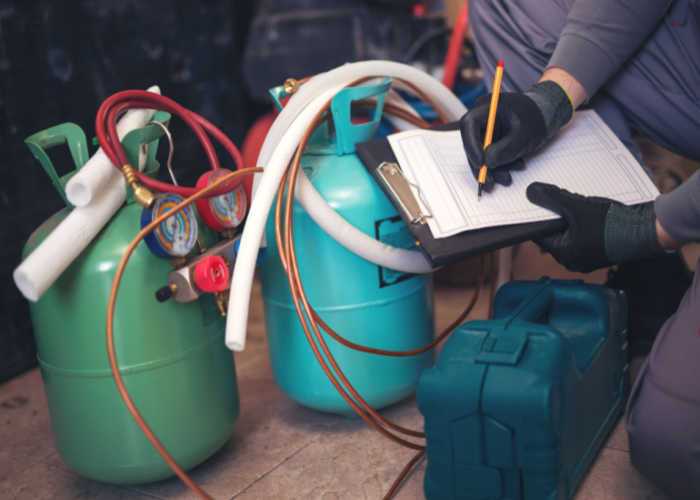How well is your commercial AC system performing? Issues like rising energy bills, frequent breakdowns, or uneven cooling could indicate it’s time to upgrade. Though there could be a simple repair that could extend its life.
When choosing between repair or replacement, it’s key to balancing cost, efficiency, and practicality.
With that in mind, here are some questions to ask to make the best decision for your business needs and budget.
Most commercial air conditioning systems are designed to last between 15 and 20 years. Though their actual lifespan depends on factors like maintenance, usage, and environmental conditions.
As units age, they often become less efficient, prone to breakdowns, and more expensive to run. Older models also lose their ability to maintain consistent temperatures effectively and may require hard-to-find replacement parts.
If your system is over 15 years old and facing recurring problems, scheduling a professional inspection is a smart first step.
An experienced HVAC engineer can evaluate its condition and advise whether a replacement would provide better value.

Rising energy costs often signal that your air conditioning system is working harder than it should to maintain a comfortable environment.
Dirt buildup, wear and tear, and outdated technology reduce efficiency over time, leading to higher energy consumption. In contrast, newer units are designed to meet strict energy standards and achieve the same cooling output using far less power.
To gauge efficiency, compare recent energy bills to those from previous years for the same season. If bills are steadily climbing and your system struggles to cool spaces evenly, it might be time to consider an upgrade.
Frequent repairs can be both costly and disruptive, particularly in a commercial setting where climate control impacts customers and employees. If your system breaks down multiple times a year or requires increasingly expensive fixes, it may be more economical to replace it.
As a rule of thumb, repair costs exceeding 50% of a new system's price rarely justify keeping an old unit.
Assess the total amount you’ve spent on repairs over the past few years. If those costs are climbing significantly, it’s likely time to decommission your commercial air conditioning system.
As businesses grow and change, their cooling requirements often evolve too. More employees, additional equipment, or expanded spaces can increase demand on your commercial AC system.
If your current unit struggles to maintain consistent temperatures, runs for extended periods, or causes certain areas to feel too warm or too cold, it may no longer be suitable for your needs.
An HVAC professional can analyse your cooling requirements and recommend a system that’s appropriately sized for your space. Modern systems with zoned cooling capabilities allow you to control temperatures in specific areas, enhancing comfort and efficiency.

Older systems often use refrigerant gases with high Global Warming Potential (GWP), which are being phased out due to environmental regulations.
These gases are no longer produced, so servicing relies on recycled refrigerants - recovered, purified, and reused from older systems. However, limited supply makes them more expensive and harder to source, increasing repair costs and delays.
Modern systems use eco-friendly refrigerants that are more efficient and compliant with current standards. An F-Gas certified contractor can advise whether converting your existing system to use a modern alternative is possible, or if a full replacement would be more cost-effective.
If sustainability matters to your business, it’s worth considering the impact of your current air conditioning system. Older units often use more energy and outdated technology, contributing to a larger carbon footprint.
Upgrading to a newer system with a high Seasonal Energy Efficiency Ratio (SEER) can significantly reduce energy use and operating costs. Plus, it shows your commitment to greener practices.
While a replacement system requires an upfront investment, the savings often outweigh the initial expense. Modern units reduce energy bills, lower repair costs, and improve reliability, minimising costly downtime and disruptions.
Request quotes from reputable HVAC suppliers who can detail potential savings and help calculate the payback period for a new system.
Many businesses find that these savings make a replacement system a worthwhile investment within just a few years.
When deciding between repair and replacement, weigh the costs and benefits carefully. If your system is outdated, inefficient, or frequently breaking down, replacement is often the smarter choice.
However, if it’s still within its expected lifespan and repairs are minor, a fix might suffice.
For the best results, work with a trusted HVAC professional to assess your system’s condition and explore your options. A well-informed decision can save you money, improve comfort, and ensure your business runs smoothly.
